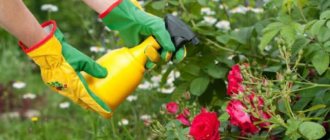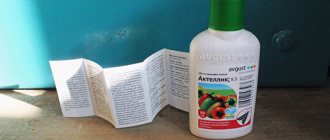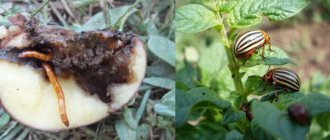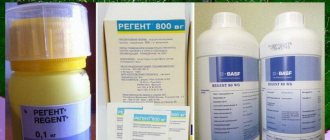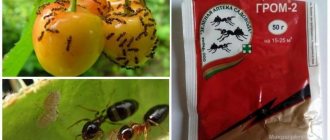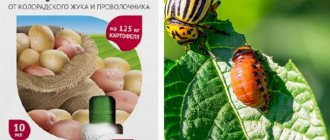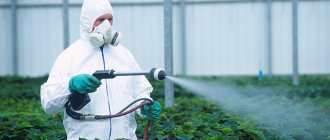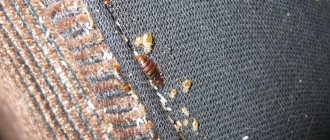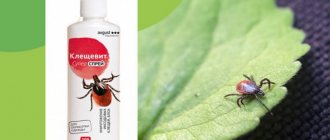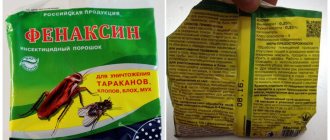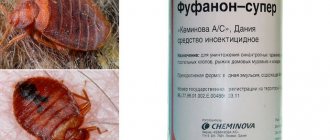What it is? General characteristics and purpose of the substance
The toxic effect of nicotine on insects has been known since ancient times. It is not without reason that tobacco dust is still used to control pests (see → the use of tobacco dust against aphids, ants, whiteflies, spider mites, slugs). But even this herbal insecticide may not always be used. Nicotine is extremely toxic not only to insects, but also to warm-blooded animals. Therefore, biochemists developed a number of synthetic substances related to nicotine, which were called neonicotinoids. In Russia they were registered in 1999.
Imidacloprid is one of the brightest representatives of this class of substances. Externally, it is a crystalline powder capable of rapid dissolution in water. Imidacloprid-based preparations are officially approved for use in agriculture as systemic insecticides.
Advantages and disadvantages of the substance
Pesticides are used in agriculture, the main substance of which is Imidacloprid. They are used to process wheat, cabbage, cucumbers, and tomatoes. They effectively destroy pests of plants and flowers. Imidacloprid with an insecticide is used against fleas , cockroaches, flies, mosquitoes, and ants.
The composition is characterized by a wide range of effects. Moreover, its effect is observed for 6 weeks after disinfestation. Moderate toxicity is considered another advantage of Imidacloprid. It is classified as toxicity group 3 and is used for treating medical and school institutions.
In this video you will learn in detail about insecticides:
The product has some disadvantages:
- toxicity, which requires the use of personal protective equipment during processing;
- cannot be used when plants are blooming or near a body of water;
- problematic solution preparation.
Effect of imidacloprid on insect pests
According to the official description, imidacloprid belongs to the group of contact-intestinal insecticides. This means that it is capable of exerting a toxic effect both through the integument of the body and from the inside - through the digestive organs. Entering the insect’s body through these routes, the substance blocks the transmission of nerve impulses at synapses, causing depression, paralysis and death.
Being a systemic drug, imidacloprid does not remain only on the surface of treated crops. It is quickly absorbed and easily moves through the vessels to all organs of the plant. This ability gives an advantage to preparations based on imidacloprid - they are not washed off by rain, circulate inside the plant for a long time and protect it for a long time (up to 28 days).
Imidacloprid has a number of other important advantages:
- Moderate toxicity to warm-blooded animals. No cases of bird death have been recorded in the treated areas.
- High efficiency. The destruction of the pest population is observed within 3-5 days.
- Long-term residual activity. Even if, some time after treatment, new individuals hatch from the remaining eggs, they die as soon as they begin to feed.
It is also important that imidacloprid preparations are approved for use not only in agricultural production, but also in personal plots.
Tip #1. You should not expect insects to die right before your eyes immediately after spraying with imidacloprid. Its toxicity through direct contact is weaker than when administered orally. Therefore, it takes time for the pest to eat a lethal dose of poison.
List of analog drugs
Imidacloprid is part of many chemical nicotines, including Commander, Confidor, Biotlin. Komandor solution is used during any growing season. For most crops, one treatment per season is indicated.
Commander is an analogue of Imidacloprid, with which treatment is carried out at any time of the day. All parts of the plant are sprayed with the solution. Commander is used against locusts and other pests. For drip irrigation, the drug Confidor is used. The substance is intended for greenhouses if the soil is wet. On average, about 1 liter of composition is consumed per 1 hectare of area.
There are a number of analogues to Imidacloprid, which act in a similar way
If it is necessary to treat seedlings before planting, their roots are moistened in the solution. The effects of Confidor are observed for a month. Many crops will require one application for the entire season. The drug is slightly toxic to Colorado potato beetles. Flowers and ornamental shrubs are sprayed with Confidor.
To protect flowers and fruit plants from pests, Biotlin is used. Repeated spraying with the drug is allowed. When young pests appear, the effect is observed after primary treatment.
It is recommended to carry out manipulation before flowering so as not to harm the bees. The protective properties last for 3 weeks. Biotlin is dangerous for earthworms and fish. It is effective for berries, fruit and flower plants. Maximum effectiveness is observed in the destruction of aphids and whiteflies; it can be used to protect indoor plants.
Application of Colorado, Sparks
Colorado is used in the fight against rodents and sucking pests. The concentrate is characterized by long-lasting effects and low consumption during processing. The leaves are sprayed with the drug, as the active component quickly penetrates the sap flow system. One-time spraying of plants for the entire season is allowed.
Colorado destroys insects that are at any stage of development. The substance is toxic to bees, so treatment is contraindicated during the flowering period. Most often used to protect fruit trees and potatoes. They can be used to spray flower beds. With the help of Colorado, larvae and adults of Colorado potato beetles, mites and caterpillars are destroyed.
The Iskra preparation applied to the plant is resistant to environmental conditions
Of the modern means with a similar effect, Iskra is used. This drug is used in 120 countries around the world. It is produced as a concentrate and powder. After treatment, the components penetrate the plant and are not washed off by rain. The effectiveness of the composition lasts for 25 days. It quickly destroys pests that are resistant to other chemicals.
The drug is also less dangerous for bees, unlike its analogues. Insects cannot feed within 60 minutes after manipulation. They die after 1-2 days.
Spark is used to process tomatoes, potatoes, and cucumbers. You can spray roses with it.
New generation products
The new generation of drugs includes Zubr.
The concentrate is sold in dispensing syringes. It affects various pests in the shortest possible time. The protection is valid for 3 weeks. Spraying is allowed during the growing season. Bison is considered an economical remedy: for 1 hundred square meters you will need 1 ml. The effectiveness of the Bison does not depend on air temperature. It is used in summer and at low temperatures. Used against Colorado potato beetles, sucking pests. They spray flowers, potatoes, tomatoes, and cucumbers. Bison is contraindicated for bees. It has low toxicity to animals and humans. This is interesting: green soap for plants.
“Imidacloprid” is also presented in the form of a concentrate, diluted with water before use.
Confidant is used in the fight against rodents, it is produced as a concentrate. The solution is packaged in canisters and is used to treat many surfaces. On dry soil, the consumption of Confidant will be too high: 100 ml per 1 square meter. Normally, the value of the indicator is 50 ml per 1 square meter. The protection is valid for 6 weeks.
The effectiveness of the substance does not decrease at high temperatures. It has no odor and is non-toxic. Confidant is dangerous to the eyes. When they are damaged, symptoms of irritation appear; To stop them, it is recommended to rinse your eyes with water.
It is prohibited to use the composition in the garden during the flowering period. Confidant is effective in killing cockroaches, ants, and bedbugs.
Species of insects sensitive to imidacloprid
When treated with imidacloprid on the leaf, the protective effect is lost after two weeks, and when watered, after a month.
The hazard class of imidacloprid for insects is I, the highest. This means that there are no species completely resistant to the substance. Therefore, the list of pests against which imidacloprid insecticides can be used is quite extensive:
- aphids;
- thrips;
- whiteflies;
- leafhoppers;
- weevils;
- flower beetles;
- cruciferous flea beetle;
- sawflies;
- ants;
- various types of flies (cabbage, onion, etc.);
- Colorado beetle;
- potato ladybug;
- turtle bug;
- pennitsa;
- codling moths;
- scale insects and false scale insects;
- caterpillars, etc.
A significant advantage of drugs based on imidacloprid is that insects do not become addicted to this poison. If used correctly, you don’t have to worry about the need to rotate insecticides on the site.
Safety precautions when processing the drug
Imidacloprid is inherently poisonous and personal protective equipment should be used when using it. Safety glasses, rubber gloves, a respirator or face shield, and a change of clothing will serve you well.
Safety measures for disinfestation against domestic parasites in enclosed spaces:
- First of all, before disinfestation, clear the area of people and warm-blooded animals. Remove or tightly cover aquariums and house plants.
- Pack food, cosmetics and personal hygiene products in thick plastic bags.
- We work with the windows open.
- Place things in the closet unless disinfestation of the cabinets themselves is required.
- Send bed linen and soft toys to the wash.
- After disinfestation, send the items to the wash, take a shower and rinse your mouth.
At a collective farm meeting. — Last year we planted 50 hectares of potatoes and they were eaten by the Colorado potato beetle. This year we planted 100 hectares - I ate it again. Next year we will plant 200 hectares - let them choke!
Safety measures when processing agricultural crops:
- Processing in the immediate vicinity of apiaries and ponds is prohibited.
- Do not use pesticides in strong winds or just before rain.
In case of contact with skin, wash with soap or 2% water-soda solution (a teaspoon of soda per glass of water). In case of contact with mucous membranes, rinse thoroughly with running water; if irritation occurs, consult a doctor. At the first signs of poisoning (nausea, vomiting, dizziness or general weakness), rinse the stomach and take activated charcoal (1 tablet per 10 kg of weight). Do not treat children, pregnant or lactating women. It is also prohibited for people with skin diseases and sensitive skin. During treatment, it is forbidden to eat, drink and smoke.
Toxicological characteristics and hazard class of imidacloprid
A study was published in 2005 that stated the following:
“The study of the dynamics of residues in plants showed that imidacloprid penetrates mainly into the leaves through the vascular system and practically does not enter the fruits, which indicates the safety of preparations based on imidacloprid during drip irrigation.”
O.Yu. Eremina, Yu.V. Lopatin, authors of the scientific work “Prospects for the use of neonicodinoids in Russian agriculture.”
For an ordinary summer resident, this means that if you do not spray imidacloprid preparations on the fruits of tomatoes, cucumbers, and apple trees, you can safely pick and eat them.
Due to its systemic action, imidacloprid is effective not only against terrestrial, but also against soil pests. In particular, the wireworm is very sensitive to it.
On the other hand, this suggests that you need to be careful when treating leaf crops and strictly follow the recommended dosages and waiting periods. The same applies to forage grasses. The hazard class of imidacloprid for warm-blooded animals is III. When the maximum permissible concentrations of the substance in feed are exceeded, toxic liver damage, encephalopathy and nephropathy are observed in animals.
Insecticides containing imidacloprid are extremely dangerous for pollinators. The substance penetrates into the pollen through the vascular system of plants, so bees can be poisoned even some time after treatment. The phenomenon of colony collapse syndrome, which is increasingly being observed by beekeepers around the world, is believed to be associated, in part, with exposure to pesticides.
Important! Imidacloprid is highly toxic to aquatic life, with the exception of fish. It is also harmful to soil microflora, causing its inhibition. Imidacloprid preparations should not be used near bodies of water. Frequent watering of the soil with this insecticide has a detrimental effect on the structure and fertility of the land.
Plants that should not be treated with imidacloprid
In connection with the above, it is advisable to classify cultivated plants that can be treated with this substance and which cannot:
| Can be treated with imidacloprid | Treat with imidacloprid with caution | Cannot be treated with imidacloprid |
|
|
|
The crops listed in the middle column can be treated with products containing imidacloprid exclusively on the foliar basis. With this method of application, the substance quickly disintegrates due to hydrolysis and photolysis. By the time of harvest, its concentration in plant tissues is minimal.
Crops from the first column can be safely treated with imidacloprid preparations either foliar or by watering.
Fast-growing greens, onions and early cabbage will not have time to free themselves from imidacloprid, even if it is applied to the leaf. Therefore, they should be protected from pests by other means.
Insecticides with imidacloprid: brands and their features
Imidacloprid as the main active ingredient is contained in many well-known drugs:
| Trademark | Description | average price |
| "Iskra Golden" | It is found in the forms of water-soluble concentrate, tablets and sticks. Can be used to protect plants both in open and protected ground, including suitable for indoor and container crops. Does not lose its protective properties at elevated temperatures. | 80 rubles for 10 ml of concentrate 100 rubles for 10 sticks |
| "Confidor Extra" | Produced in the form of water-soluble granules. For the needs of summer residents, it is packaged in packages of 1 gram and 5 grams. It is very soluble in water and is often used as an additive in containers of drip irrigation systems. | 40 rubles per 1 g |
| "Prestige" | Concentrated suspension of pink color. In addition to imidacloprid, it contains pencycuron, a contact fungicide. It is used for pre-sowing treatment of seed potatoes against fungal infections and pests. | 320 rubles for 60 ml |
| "Commander Maxi" | Produced in granular form, it dissolves well in water. It is most often used against the Colorado potato beetle, but is also effective against other pests - thrips, aphids, cruciferous flea beetle, etc. | 25 rubles per 1 g |
Analogues of these drugs are the insecticides “Kalash”, “Korado”, “Monsoon”, “Biotlin”. All of them are based on imidacloprid and are approved for private gardening.
Imidacloprid - drugs based on it
Products based on Imidacloprid are mainly pesticides and are used in the fight against agricultural pests. They cope well with processing barley, wheat, tomatoes, cabbage, and cucumbers. It is also used to destroy pests of flowers and plants. But the main quality of this substance is its good result when used against cockroaches, fleas, bedbugs, ants, flies and mosquitoes. A drug for disinfestation against domestic parasites based on Imidacloprid is Confidant. Available in the form of a water-based concentrate, packaged in plastic containers. It has a good residual effect for up to 6 weeks, does not leave stains on treated surfaces and does not have a specific odor.
Preparations for the protection of agricultural plants
“ Commander ” is a broad-spectrum product that can be used during any growing season. Do not use during the flowering period, it has a detrimental effect on bees. Destroys aphids, thrips, scale insects, bedbugs, weevils, bark beetles and locusts.
“ Confidor ” is a pesticide used in greenhouses and open ground, applied on wet soil. Consumption 1 liter per hectare of area. Residual effect up to 30 days, low toxicity for warm-blooded animals. Suitable for spraying potatoes, apple trees, plums, cucumbers, tomatoes, flowers and ornamental shrubs.
“ Biotlin ” is used to treat flowers and fruit plants. Do not use during flowering (deadly for bees), near water bodies (deadly for fish and worms). Particularly effective against whiteflies and aphids, suitable for treating house plants.
" Colorado " - used against rodents and sucking insects. Toxic to bees, do not treat during flowering. Fruit trees, flower beds and greenhouses are treated. Lethal to the Colorado potato beetle, aphids, caterpillars and ticks.
" Iskra bio " - produced in the form of a concentrate, in ampoules, bottles and powder. Slightly toxic to humans, warm-blooded animals, fish and earthworms. They process ornamental crops and flowers. Used against Colorado potato beetles, aphids, whiteflies, thrips and apple worms.
“ Zubr ” is produced in the form of a concentrate placed in a syringe or ampoules. The treatment is carried out during the growing season, the residual effect is up to 3 weeks. Lethal to bees, and low toxic to humans and warm-blooded animals. Used against Colorado potato beetles, aphids, whiteflies, and thrips. Suitable for potatoes, cucumbers, tomatoes and flowers (including roses).
Rules for the use of imidacloprid insecticides
The ready-to-use Tsvetolux Bau spray with imidacloprid is suitable for treating indoor plants.
For each of the listed imidacloprid insecticides, its own instructions for use have been developed, which indicate the norms for dilution and consumption of the drug. It is strictly necessary to follow these recommendations, since imidacloprid is not safe for the environment. When processing, it is also important to consider the following general rules:
- to protect against soil or stem pests (wireworm, stem fly, gall midge), treatment is done by watering;
- for protection against ground leaf pests (aphids, Colorado potato beetles, caterpillars, cruciferous flea beetles, etc.), leaf spraying is effective;
- treatments are not carried out during the flowering period of crops - from the budding phase to the beginning of the formation of ovaries;
- during the treatment period, the flight of bees is limited to 120 hours;
- do not use drug solutions at temperatures exceeding +350C;
- Do not spray with preparations in windy weather, in direct sunlight or in the rain;
- To avoid accumulation of the substance in the soil, constant watering of the same bed with imidacloprid solutions is not practiced; the interval should be at least 2 years.
After irrigation with imidacloprid, it is advisable to take measures to restore the population of beneficial soil flora. For this purpose, EM solutions and mulching with organic matter are used.
Security measures
When working with drugs containing imidacloprid, the following rules must be observed:
- all work is carried out wearing protective clothing (gloves, rubber boots, overalls, goggles); spraying in strong winds and before rain is not carried out;
- cultivation of beds near apiaries and ponds is prohibited;
- indoor work is carried out in the absence of children and animals;
- food, dishes and aquariums must be covered;
- water used for washing clothes and rinsing sprayer parts must not be drained near water bodies or into sewers;
- after completing the work, you must wash your face and hands with laundry soap and rinse your mouth with water;
- In case of contact with the solution, eyes are washed for at least ten minutes;
- at the first signs of poisoning - nausea, weakness, it is necessary to rinse the stomach, take activated charcoal (a tablet per ten kilograms of weight) and consult a doctor.
Imidacloprid and related neonicotinoids
It is unwise to use the same insecticide over and over again.
This leads to the development of resistance (immunity). Imidacloprid has "close relatives" belonging to the neonicotinodes class. These are substances such as acetamiprid, clothianidin and thiacloprid. Preparations based on them can also be classified as analogues of imidacloprid insecticides:
- acetamiprid – “ Mospilan ” → application + reviews, “Stozhar”;
- clothianidin - “Apache”, “Bushido”, “Punisher”;
- thiacloprid – “Calypso”, “ Aktara ” → how to use + reviews.
If for some reason imidacloprid does not work, it is better not to use related drugs for re-treatment, but to turn to poisons from other chemical classes.
Reviews on the use of imidacloprid drugs
The high popularity of such insecticides as, for example, “ Konfidor ” → how to use + reviews and “Iskra Zolotaya” (reviews about the drug) did not arise out of nowhere. It is due to the real effectiveness of imidacloprid insecticides, which is confirmed by reviews from summer residents:
“In our dacha society, the situation with pests, to put it mildly, leaves much to be desired. Aphids eat everything - from apple trees to tomatoes in the greenhouse. After widespread poisoning with pyrethroids, she stopped responding to half of the drugs available to mere mortals. Exhausted, I took Confidor Maxi for the Colorado potato beetle and sprayed it all over. I saw the result within a day - the aphid finally died” (Kirill, Samara).
